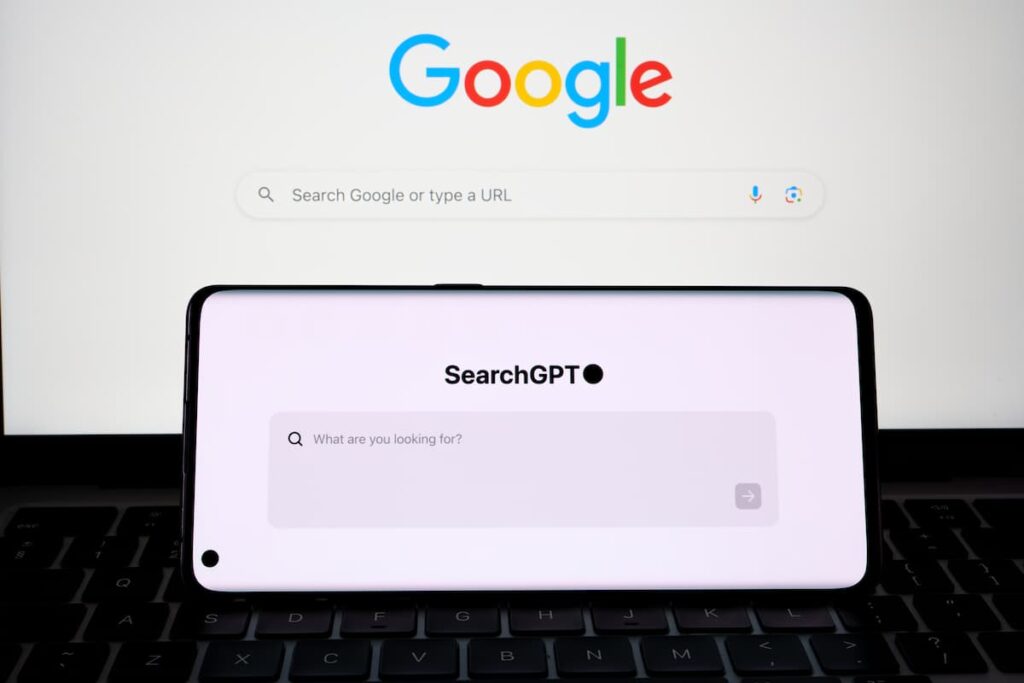As a senior living operator, considering current and future technologies is essential for connecting with families and seniors. However, staying up-to-date with artificial intelligence may seem intimidating, and you may be disheartened to hear about AI’s potential impacts.
Recent research has confirmed that, yes, an AI tool called SearchGPT is disrupting SEO — but don’t fear! Our full-service marketing team at Craft & Communicate has the details to share with you and some strategies to work with, rather than against, the change.
What’s the Difference Between ChatGPT and SearchGPT?
ChatGPT and SearchGPT are generative AI programs developed by industry leader OpenAI. This company recently strengthened its presence even further through ChatGPT’s integration into Apple devices.
OpenAI’s two tools are often used independently by the general public. Developers can also work with their open-source — freely available — APIs (application programming interfaces, which allow different computer programs to communicate with each other), SDKs (software development kits to simplify the development process), and other convenient tools to create or contribute to custom software.
Here are just a few ways these two programs created by OpenAI differ from each other.
ChatGPT
- Purpose: ChatGPT generates human-like text based on input, focusing on conversational interactions. It is typically used for chat-based applications where it responds to questions, provides explanations, and engages in dialogue.
- Functionality: It generates responses using the knowledge it has been trained on up to a certain point. It doesn’t have access to real-time data or the ability to perform searches; responses are based on pre-existing knowledge.
- Use Cases: Customer support, copywriting for online content and marketing materials, and chatbots.
SearchGPT
- Purpose: SearchGPT is focused on presenting information from the web or other databases in real time. It could be designed to interact with search engines or databases to find and synthesize current data.
- Functionality: It performs live searches, compiles data from multiple sources, and provides up-to-date information that ChatGPT can’t.
- Use Cases: Research, getting real-time data such as the news, and finding specific information quickly.
Basically, while ChatGPT relies on pre-trained knowledge, SearchGPT accesses real-time data. ChatGPT is more suited to senior living operators who want to enhance their marketing; their target audience of seniors and their families are more likely to find accurate information about senior communities with SearchGPT.
Despite these differences, Open AI’s eventual goal is to “integrate the SearchGPT experience into ChatGPT in the future.”
Open AI’s eventual goal is to “integrate the SearchGPT experience into ChatGPT in the future.”
What Makes SearchGPT a Competitor to Google and Bing?
Research from Brightedge shows how SearchGPT is reshaping how senior living communities engage with potential residents online.

Although Google’s AI Overviews (AIO) from the software Gemini and Microsoft Bing’s Copilot offer alternative summaries directly within their search engines, they and other AI programs such as Perplexity are still challenged by SearchGPT’s results, which often contain the following:
- Comprehensive, Trustworthy Answers: Despite being in its prototyping stage, SearchGPT already excels in providing detailed, trustworthy responses, which is crucial for families making important decisions about senior care. Unlike Google AIO, which focuses on quick, trend-based answers, SearchGPT gives in-depth information, making it ideal for those seeking to understand complex aspects of senior living, such as care levels, pricing, and community amenities.
- Diverse and Authoritative Sources: The platform pulls information from a wide range of reliable sources, including health care journals, government websites, and industry-specific platforms. This diversity ensures that the information presented is both accurate and comprehensive — both factors for building trust with potential residents and their families.
- Proactive Query Interpretation: SearchGPT doesn’t just answer the immediate question; it expects and addresses broader concerns, giving more context and real-world examples. This is particularly beneficial in senior living marketing, where understanding the nuances of care options, financial planning, and lifestyle benefits are all big parts of the decision-making process.
By merging advanced generative AI with real-time web data, SearchGPT presents relevant, well-cited answers to search queries that are often more accurate than the AI software developed by Google and Bing.
Addressing Current Challenges of AI and SEO
Senior living SEO and content marketing are now more complex. For senior living marketers, the rise of SearchGPT is part of a shift toward more in-depth, authoritative content.
Make Your Community an Authoritative, Interesting, and Empathetic Source Across the Web
As families increasingly turn to AI-powered tools for research, the demand for well-researched, comprehensive content that addresses their concerns will grow. This means moving away from brief, keyword-stuffed content toward more meaningful, informative pieces that truly matter.
On the other hand, SearchGPT’s in-depth responses might be overwhelming for families seeking quick information. Additionally, its reliance on established sources could exclude newer perspectives or smaller communities’ voices. To maintain engagement, senior living communities like yours will need to create content that is both informative and accessible to a wide range of people.
Over the past few years, AI-generated writing and imagery have become incredibly common. It may seem like the only way to compete with other senior living communities without increasing marketing and labor costs is to use AI when producing your own content — but is this really worthwhile?
Does Using AI-Generated Content on Your Own Website Affect Overall SEO?
In short, generative AI tools can help you put out great content in less time — but not with less care.
Even though AI software options such as ChatGPT contain custom settings to match your tone of voice and ideal audience, it is far from flawless and also far from human. Search engines such as Google don’t technically penalize AI-generated content, but their recent updates have shown a clear preference for relatable and user-friendly content. That’s where your team’s personal expertise comes in.
To us, AI is an excellent brainstorming device for developing creative ideas, exploring multiple perspectives, and refining prompts as well as concepts. It can definitely write first drafts, which are just that: drafts in need of experience-based insight, fact-checking, and other revisions. AI provides a foundation; the human touch brings authenticity, empathy, and context to the final content, resulting in a better chance of showing up in traditional search engines as well as AI search results.
Don’t Forget About Technical and Off-Page SEO
Less-noticeable aspects of your website — including fast loading speeds, responsive design for mobile devices, and links from (as well as to) other websites — are still signals of a great and informative user experience, which AI technologies and search engines factor into visibility.
Staying Ahead in Search Engine and AI Rankings
SEO isn’t going away; in fact, it’s expanded across new platforms and is using more advanced ranking criteria.
AI offers a new search engine experience along with an opportunity to rethink how senior living communities connect with potential residents online. By focusing on credibility and depth in your community’s digital marketing strategies, you can build stronger, more trusting relationships with families and seniors than ever before.
As the industry continues to evolve, working alongside — rather than against — tools like SearchGPT will be key to remaining competitive, and we’re here to help you do just that. Reach out to Craft & Communicate for continual SEO support.


